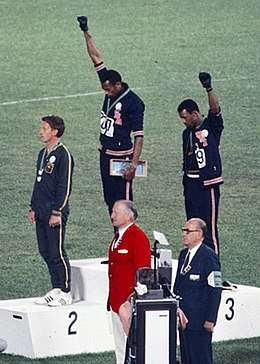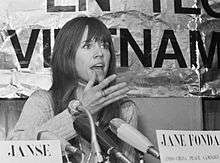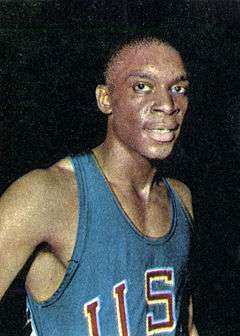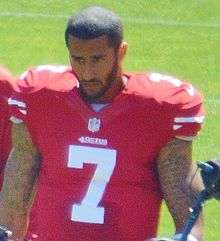U.S. national anthem protests

Protests during the playing of the United States national anthem have had many causes, including civil rights, anti-conscription and anti-war, anti-nationalism, and religious reservations. "The Star-Spangled Banner" was adopted as the official national anthem by U.S. President Woodrow Wilson in 1916, and was made the national anthem by a congressional resolution on March 3, 1931. Before that time, protests also occurred when a number of songs were used as unofficial national anthems, including "My Country, 'Tis of Thee" and "Hail, Columbia".
Early examples
In 1892, three men, including a friend of Ida B. Wells, were lynched by a white mob while in police custody in Memphis, Tennessee, in an event known as the Peoples Grocery lynching. The act sparked a national outcry. At a meeting of one thousand people at Bethel A. M. E. Church, Reverend W. Gaines' call for the crowd to sing the then de facto national anthem, "My Country, 'Tis of Thee", but the call was refused, one member of the audience declaring, "I don't want to sing that song until this country is what it claims to be, 'sweet land of liberty'".[1] The Reverend substituted the Civil War-era song about the abolitionist martyr, "John Brown's Body". Well's husband, Ferdinand L. Barnett, closed the meeting appealing for calm and a careful response, but also expressing great frustration and concern that the violence against blacks may one day lead to reprisals.[1]
Early 20th century

Refusal to stand during the national anthem became a widespread form of protest during World War I. In some cases, this was related to protest of conscription.[2] It was also associated with support for Socialism,[3][4] Bolshevism,[5] or Communism. In one case, supporters of the Communism refused to stand during the song at a trial of Emma Goldman.[6] The act of protest was very controversial, and many people were highly offended, so that even accidentally remaining seated could result in violence.[7]
Protests during the anthem continued after World War I. For example, during the build-up towards World War II, a group of students at Haverford College in Philadelphia refused to stand because they felt the custom was leading to "rabid nationalism".[8] In 1943 in Arizona a federal judge ruled that members of Jehovah's Witnesses cannot be suspended from school for refusing to stand during the national anthem.[9]
1960s and 1970s

In the 1960s, refusal to stand during the anthem took place for a number of reasons. In the late 1960s, the protest became increasingly common among athletes and at schools, both as a protest of the Vietnam War and as a protest of nationalism. In December 1968, Chris Wood, co-captain of the Adelbert College basketball team was removed from the team for not standing, saying, "We believe in the fellowship of man. We don't believe in nationalism."[10] Five white high school students were suspended in Cumberland, Maryland in February 1970.[11] A federal judge Joseph P. Kinneary ordered reinstatement of a pair of students in Columbus, Ohio, saying that forcing anyone to participate in "symbolic patriotic ceremonies" against their will was a violation of the First Amendment to the US Constitution.[12] In November 1970, Kaye Stevens refused to sing the national anthem before a NFL game between the Pittsburgh Steelers and Kansas City Chiefs, although she had sung the previous week when the Steelers played the New York Jets. She said she was protesting the Steelers planned expenditure of $37 million on the new Three Rivers Stadium when local officials were underfunding treatment for drug users.[13]
From 1968 onwards, Jimi Hendrix performed an instrumental version using feedback, distortion and other effects to deconstruct the music with the sonic images of rockets and bombs. Common interpretations link this to a protest against the Vietnam War, opposed to Hendrix own explanation: "We're all Americans ... it was like 'Go America!'... We play it the way the air is in America today. The air is slightly static, see".[14]
Donald Sutherland, Gary Goodrow, Peter Boyle, and Jane Fonda developed an anti-war comedy show which featured a skit about people refusing to stand during the anthem which toured about 20 cities in 1971.[15]
Civil rights movement
At the same time, Civil Rights became an important cause which led to anthem protests. The 1968 Olympics Black Power salute was a political demonstration conducted by African-American athletes Tommie Smith and John Carlos during their medal ceremony at the 1968 Summer Olympics in the Olympic Stadium in Mexico City. After having won gold and bronze medals, respectively, in the 200 meter running event, they turned on the podium to face their flags, and to hear the American national anthem, "The Star-Spangled Banner". Each athlete raised a black-gloved fist, and kept them raised until the anthem had finished. In addition, Smith, Carlos, and Australian silver medalist Peter Norman all wore human rights badges on their jackets. In his autobiography, Silent Gesture, Smith stated that the gesture was not a "Black Power" salute, but a "human rights salute". The event is regarded as one of the most overtly political statements in the history of the modern Olympic Games.[16]
In 1969, University of Wyoming coach Lloyd Eaton dismissed 14 black football players who requested to wear black armbands to protest the racial slurs they faced during games, particularly against BYU. When the two teams played in 1971, about 50 students at UW refused to stand during the national anthem and wore black armbands during the game.[17] Another place where African Americans refused to stand during the anthem in 1971 was at Northern Illinois University basketball games, which led to widespread criticism.[18]
The protests became widespread, and in some cases, arrangements were made for the anthem to be played before athletes left the locker room. Lew Alcindor, later known as Kareem Abdul-Jabbar, began to refuse to stand at UCLA basketball games, and in response the anthem was played before the players left the locker room in the UCLA-University of Washington game.[19] The same was done when the five starters of Florida State University's basketball team, all African American, played Tulane University in 1971 in New Orleans.[20]

During the 1972 Summer Olympics in Munich, Vincent Matthews of New York City and Wayne Collett of Santa Monica, California came in first and second in the 400 meter race. The pair refused to stand at attention on the victory stand to boos and whistles from the crowd.[21] The pair were barred from running in the 1,600 meter relay later in the games.[22]
Civil rights based protests continued into the late 1970s, In 1978, a student was barred from receiving his diploma in Dayton, Ohio for refusing to sing.[23]
Turn of the millennium
On August 24, 1990, Irish pop singer Sinead O'Connor threatened to boycott her scheduled performance that night at the Garden State Arts Center in Holmdel Township, New Jersey, if the U.S. national anthem were played. In her own words, she explained,
I sincerely harbor no disrespect for America or Americans, but I have a policy of not having any national anthems played before my concerts in any country, including my own, because they have nothing to do with music in general...I am concerned though, because today, we're seeing other artists arrested at their own concerts...There is a disturbing trend towards censorship of music and art in this country and people should be alarmed over that far more than my actions...
The Center gave in to her demands, but not without controversy. Frank Sinatra criticized her the following evening while performing at the same venue, stating that he wished that he could "kick her in the ass." New York state Senator Nicholas Spano urged people to boycott O'Connor's subsequent show in Saratoga, saying "I'm sure Ms. O'Connor would be the first to complain if someone tried to censor her performance, yet she is trying to censor the national anthem by refusing to perform where it is played."[24]
In 1996, there was protest in the NBA, when Mahmoud Abdul-Rauf, guard for the Denver Nuggets, refused to stand during the anthem before games in protest of anti-Islamic rhetoric. He was suspended for his actions and received hostile responses and death threats, but the issue receiving widespread attention.[25][26][27] It was noted that at the same time Sam Perkins, who played for the Seattle SuperSonics, is a Jehovah's Witness who refuse to pledge allegiance to any government; he stood apart from his teammates during the national anthem. George Shinn, owner of the Charlotte Hornets, threatened to trade any player who refused to stand.[28][29] After his suspension, Abdul-Rauf stood, but with his head bowed in silent prayer.[30]
In 2003, two women's basketball players, Toni Smith of Manhattanville College and Deidra Chatman of the University of Virginia, made headlines for refusing to face the flag during the national anthem. Chatman, a Jehovah's Witness, protested for one game in March 2003 due to her anti-war views in light of the then-current tensions between the U.S. and Iraq.[31] Smith, who had been boycotting the anthem all season long before being finally noticed in February 2003, said that she was also protesting the United States' involvement in Iraq, as well as a growing disparity between the rich and the poor. During one of her team's games on February 23, 2003, a fan named Jerry Kiley, a self-described Vietnam veteran, ran onto the court and confronted her with an American flag, saying, "She has not earned the right to disrespect the flag."[32]
In 2004, Carlos Delgado of the Toronto Blue Jays Major League Baseball team decided he would no longer stand during the song, "God Bless America" out of protest at America's wars in the Middle East.[29]
2016–present

During 2016, several professional athletes protested police brutality during the United States (U.S.) national anthem. The protests began in the National Football League (NFL) after San Francisco 49ers quarterback (QB) Colin Kaepernick sat during the anthem, as opposed to the tradition of standing, before his team's third preseason game of 2016. Kaepernick also sat during the first two preseason games, but he went unnoticed.[33] The protests have generated mixed reactions and have since spread to other U.S. sports leagues.
Stemming from the Kaepernick controversy, before the beginning of the 2016 World Cup of Hockey tournament in Toronto, Canada, Team USA coach John Tortorella told in an interview that if any one of his players were to sit out during the anthem, they would sit on the bench for the entire duration of the game.[34]
References
- 1 2 Wouldn't Sing America," The Evening World (New York, New York) March 28, 1892, page 3, accessed September 16, 2016 at https://www.newspapers.com/clip/6654115/wouldnt_sing_america_the_evening/, Not Their Country, The Decatur Herald (Decatur, Illinois) March 29, 1892, page 1, accessed September 16, 2016 at https://www.newspapers.com/clip/6657652/not_their_country_the_decatur_herald/
- ↑ YMCA Boys Force A Slacker to Salute, The St. Louis Star and Times (St. Louis, Missouri) June 1, 1917, page 3, accessed October 21, 2016 at https://www.newspapers.com/clip/7116016//
- ↑ Asked to Resign, The Los Angeles Times (Los Angeles, California) October 30, 1917, page 13, accessed October 21, 2016 at https://www.newspapers.com/clip/7116078/asked_to_resign_the_los_angeles_times/
- ↑ Men who Sat While Anthem was Played Escape Fines, Jail, The Oregon Daily Journal (Portland, Oregon) June 18, 1918, page 4, accessed October 21, 2016 at https://www.newspapers.com/clip/7116139//
- ↑ Disturbers Cheer the Bolshevists and Show Contempt For Anthem, Harrisburg Telegraph (Harrisburg, Pennsylvania) December 9, 1918, page 16, accessed October 21, 2016 at https://www.newspapers.com/clip/7116158//
- ↑ Reds Turned Out at Trial of Emma, The Sun (New York, New York) July 7, 1917, page 4, accessed October 21, 2016 at https://www.newspapers.com/clip/7116037/reds_turned_out_at_trial_of_emma_the/
- ↑ Labor Delegates Strike Man who Spurns Anthem, The St. Louis Star and Times (St. Louis, Missouri) December 10, 1917, page 3, accessed October 21, 2016 at https://www.newspapers.com/clip/7116113//
- ↑ Students Refuse to Stand While Anthem is Sung, Wilkes=Barre Evening News (Wilkes-Barre, Pennsylvania) May 31, 1934, page 21, accessed October 21, 2016 at https://www.newspapers.com/clip/7116195//
- ↑ Judge Rules for Religious Sect in Fight Over National Anthem, The San Bernardino County Sun, (San Bernardino, California) August 30, 1963, page 11, accessed October 21, 2016 at https://www.newspapers.com/clip/7116227//
- ↑ Didn't Stand For Anthem, Is Dismissed, El Paso Herald-Post (el Paso, Texas) December 11, 1968, page 24, accessed October 21, 2016 at https://www.newspapers.com/clip/7116260//
- ↑ Suspend Students Refusing to Stand for Pledge, Anthem, The Daily Courier (Connellsville, Pennsylvania) February 25, 1970, page 19, accessed October 21, 2016 at https://www.newspapers.com/clip/7116277//
- ↑ Anthem Protest Pair Reinstated, Lubbuck Avalanche-Journal (Lubbock, Texas (July 8, 1970), page 75, accessed October 21, 2016 at https://www.newspapers.com/clip/7116307/anthem_protest_pair_reinstated_lubbuck/
- ↑ Refuses to Sing Anthem, Traverse City Record-Eagle (Traverse City, Michigan) November 14, 1970, page 13, accessed October 21, 2016 at https://www.newspapers.com/clip/7116365//
- ↑ Cross 2005, p. 271.
- ↑ Anti-War Show has SRO Crowd, The Troy Record (Troy, New York) March 15, 1927, page 1, accessed October 21, 2016 at https://www.newspapers.com/clip/7116407/antiwar_show_has_sro_crowd_the_troy/
- ↑ Lewis, Richard (8 October 2006). "Caught in Time: Black Power salute, Mexico, 1968". The Sunday Times. London. Retrieved 9 November 2008.
- ↑ Wyoming President Says Black 14 Issues Remain, The Daily Herald (Provo, Utah) October 21, 1971, page 19, accessed October 21, 2016 at https://www.newspapers.com/clip/7116500//
- ↑ Banning Anthem Discraceful Action, Belvidere Daily Republican (Belvidere, Illinois) December 20, 1971, page 6, accessed October 21, 2016 at https://www.newspapers.com/clip/7116534//
- ↑ Walt Brown, Athletes, Celebrities Personal Moments: The 60s and 70s, AuthorHouse, Mar 10, 2016
- ↑ FSU Starters Refuse to Stand for Anthem, Albuquerque Journal (Albuquerque, New Mexico) January 14, 1971, page 25, accessed October 21, 2016 at https://www.newspapers.com/clip/7116445//
- ↑ Athletes Disregard National Anthem, The Bonham Daily Favorite (Bonham, Texas) September 8, 1972, page 5, accessed October 21, 2016 at https://www.newspapers.com/clip/7116591//
- ↑ Two US Athletes Barred From Further Olympic Actions, Traverse City Record-Eagle (Traverse City, Michigan) September 8, 1972, page 14, accessed October 21, 2016 at https://www.newspapers.com/clip/7116613//
- ↑ Won't Sing Anthem, so no Diploma, The Pantagraph (Bloomington, Illinois) June 4, 1978, page 10, accessed October 21, 2016 at https://www.newspapers.com/clip/7116628/wont_sing_anthem_so_no_diploma_the/
- ↑ "Legislator Urges Boycott Over Sinead's Anthem Ban". Los Angeles Times. Times-Mirror Co. Times Wire Services. p. 10. Retrieved September 28, 2017.
- ↑ Home, Hostile Home, New York Times (August 8, 2013)
- ↑ Jim Hodges (March 13, 1996). "NBA Sits Abdul-Rauf for Stance on Anthem". The Los Angeles Times. Retrieved December 6, 2016.
- ↑ Jackson, Sarah J. Black Celebrity, Racial Politics, and the Press: Framing Dissent. Routledge, 2014. p117-118
- ↑ McCallum, Jack, "Oh Say Should We Sing?" Sports Illustrated, March 25, 1996, accessed October 21, 2016.
- 1 2 Abrams, Roger I. Playing Tough: The World of Sports and Politics. UPNE, 2013. p4
- ↑ Abrams 2014, p 125
- ↑ Reedy, Jim (March 4, 2003). "U-Va. Protest Takes an About Face". Washington Post. WP Company. Retrieved September 28, 2017.
- ↑ Pennington, Bill (February 26, 2003). "Player's Protest Over the Flag Divides Fans". New York Times. NY Times Company. Retrieved September 28, 2017.
- ↑ Sandritter, Mark. "A timeline of Colin Kaepernick's national anthem protest and the NFL players who joined him". SB Nation. Retrieved 20 September 2016.
- ↑ "Tortorella 'will sit' any Team USA player who protests anthem - Sportsnet.ca". Sportsnet.ca. Retrieved 2017-02-12.
- Cross, Charles R. (2005). Room Full of Mirrors: A Biography of Jimi Hendrix. Hyperion. ISBN 978-0-7868-8841-2.